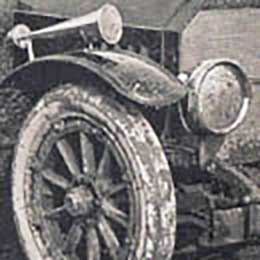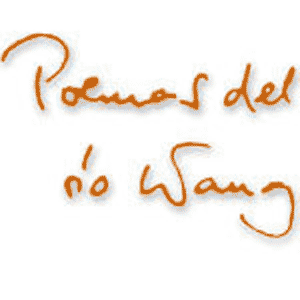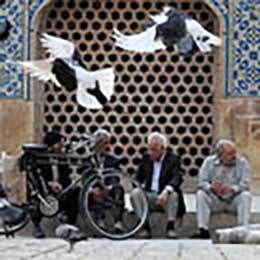

The Leshchenko Cabaret, dubbed even in Paris as “the Maxim’s of the East”, was one of the most fashionable places of entertainment in the Bucharest of the thirties. In addition to the metropolitan elite and the foreign aristocrats, its regulars also included those Russian emigrants, aristocrats, White officers and middle-class people, who during the war and the civil war managed to get through to Bessarabia, annexed to Romania. For them was written by the leader of Leshchenko’s orchestra, the Izmail-born George Ipsilanti the song Тоска по родине, “Homesickness”, which regularly featured in Leshchenko’s repertoire. A recording, however, was made only in the 1940s with Ipsilanti’s wife, the Chisinău/Kishinev-born Alla Bayanova. The song, which was banned in the Soviet Union, spread across the country via the smuggled copies of this disc, and the Homesickness, written by Bessarabian Romanian singers and a Greek composer, became a kind of an unofficial Russian anthem.

George Ipsilanti – Pyotr Leshchenko: Тоска по Родине (Homesickness). Song: Alla Bayanova. For the Hungarian version by Bori Rutkai see here
Я иду не по нашей земле. Просыпается серое утро. Вспоминаешь ли ты обо мне, Дорогая моя, златокудрая? Предо мною чужие поля. Как у нас в голубом тумане, Серебрятся вдали тополя Этим утром холодным, ранним. ПРИПЕВ: Я тоскую по родине, По родной стороне моей. Я теперь далеко-далеко В незнакомой стране. Я тоскую по русским полям. Мою боль не унять мне без них. И по серым любимым глазам,- Как мне грустно без них... Проезжаю теперь Бухарест. Всюду слышу я речь неродную. И от всех незнакомых мне мест Я по родине больше тоскую. Там идут проливные дожди. Их мелодия с детства знакома. Дорогая, любимая, жди, Не отдай мое счастье другому. | I am traveling not on our land, gray morning dawns on me. Do you still remember me, my dear, my golden-haired? Foreign fields stretch out in front of me like at home in the blue haze, the bark of the poplar shines like silver on this cold, early morning. REFRAIN: I long for my homeland, for my native country here, far, very far, in a foreign land for the Russian fields. My pain is not relieved without them and without the beloved gray eyes how sad it is for me… My way leads now through Bucharest: I hear foreign speech everywhere and every uknown place makes me long stronger for my homeland. The rain falls heavily there, its melody is well known to me since my childhood. My dear, my beloved, wait for me: don’t give my happiness to others! |

The native land, however, waited in vain. The emigrants did not see it any more. On the contrary, the Soviet Union marched into Bucharest. Leshchenko was arrested by the Romanian secret police and he died in the prison of Târgu Ocna in 1954. Bayanova was imprisoned during the war by the Romanian police for singing in Russian. After her release she was condemned to silence, and only in the 1960s she was allowed to leave for the Soviet Union. Ipsilanti managed in time to flee to America, and he died in Los Angeles in 1994. And the hopeful and nostalgic hymn of the emigrants to their homeland became a labor camp song expressing the reality of the same homeland with the title Не печалься, любимая, “Don’t worry, my beloved”, as we can hear in Dmitry Astrakhan’s film Всё будет хорошо, “Everything will be all right” (1995).
За вагоном проходит вагон С мерным стуком по рельсовой стали Спецэтапом идет эшелон Из столицы в таежные дали. Заметает пургой паровоз, В окнах блещет морозная плесень. И порывистый ветер донес Из вагона знакомую песню. ПРИПЕВ: “Не печалься, любимая, За разлуку прости ты меня, Я вернусь раньше времени, жди. Дорогая, прости. Как бы ни был мне приговор строг, Я вернусь на заветный порог И, тоскуя по ласкам твоим, Постучусь под окном.” Двадцать лет трудовых лагерей, И в подарок рабочему классу Там, где были тропинки зверей, Мы проложим таежную трассу. Утопали в снегах трактора, Даже “сталинцу” сил не хватало, И тогда под удар топора Эта песня в тайге прозвучала: “Не печалься, любимая…” | Wagon after wagon passes rattling along the steel tracks: a prisoner shipment is carried by the train from the capital to the far away taiga. The train is attacked by a snow storm, mold of frost glitters around the window, and the raging wind sweeps along a well known song from the wagon: REFRAIN: “Don’t worry, my beloved! Forgive me for the separation! I will soon come back to you, I swear to you, my dear! No matter, how severe the sentence is, I will return to the beloved threshold, and longing for your caress I will knock on your window in silence…” Twenty years of labor camp, and as a gift to the working class where the paths of beasts used to be we break a track in the taiga. The tractor is sinking into the snow, even the “stalinitsa” has not enough power, and then, at the rhythm of the axe blows this song resounded in the taiga: “Don’t worry, my beloved!…” |




























































































































































Add comment